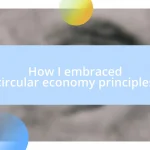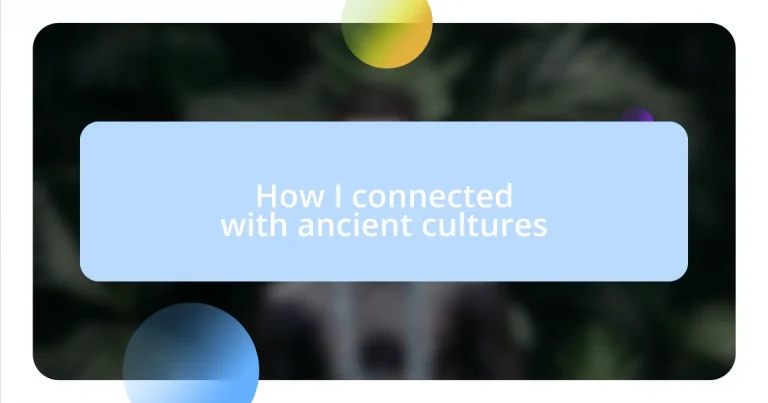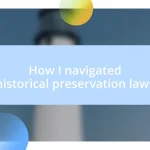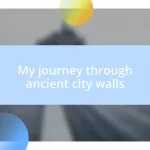Key takeaways:
- Immersion in ancient cultures through travel and participation in rituals deepens understanding and connection to their values and traditions.
- Engaging with artifacts and participating in cultural events provides a tangible link to history, evoking reflections on the shared human experience.
- Applying insights from ancient wisdom, such as mindfulness and sustainability, can enhance modern life by fostering community and environmental responsibility.
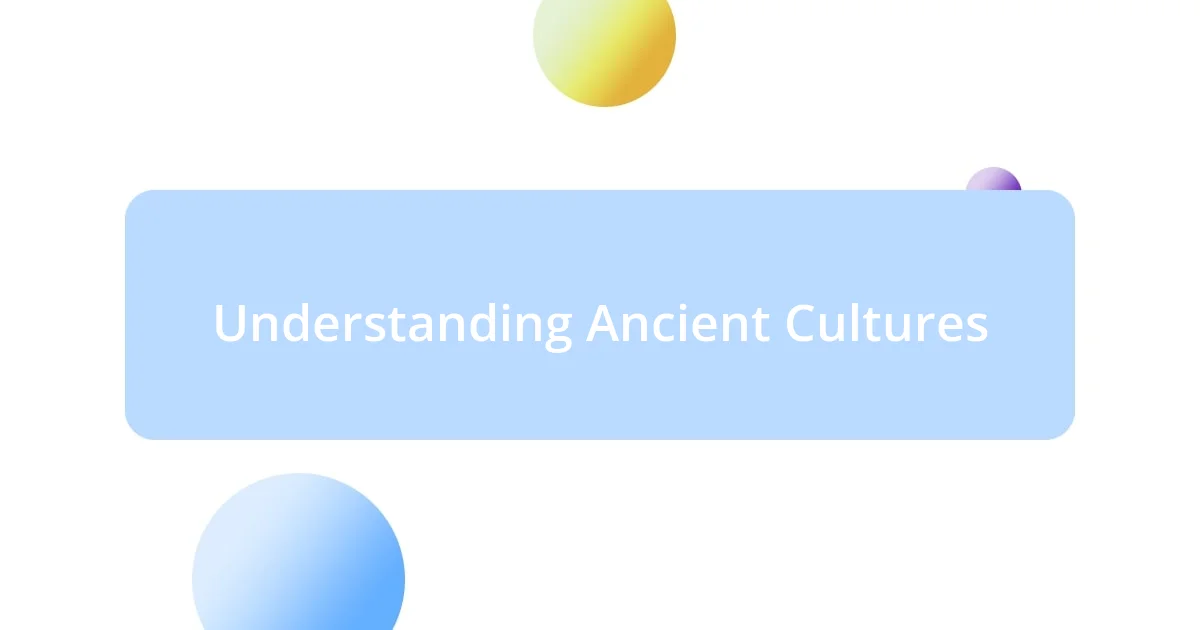
Understanding Ancient Cultures
Understanding ancient cultures requires diving deep into the stories they tell. I vividly remember visiting the ruins of an ancient city, where each stone seemed to whisper secrets of the past. Can you imagine walking where someone stood thousands of years ago, contemplating the same skies?
Every culture has unique traditions and beliefs that express their values. I once encountered a tribal community that revered nature in a way I had never witnessed before, teaching me that respect and interconnectedness are timeless principles. What do their practices teach us about our relationship with the world today?
As I studied various civilizations, I learned that their languages, art forms, and rituals give us insight into their daily lives and thoughts. I often wonder how different my life might be if I had been born into an ancient culture, living by their ideals and wisdom. Don’t you find it fascinating how the essence of human experience transcends time?
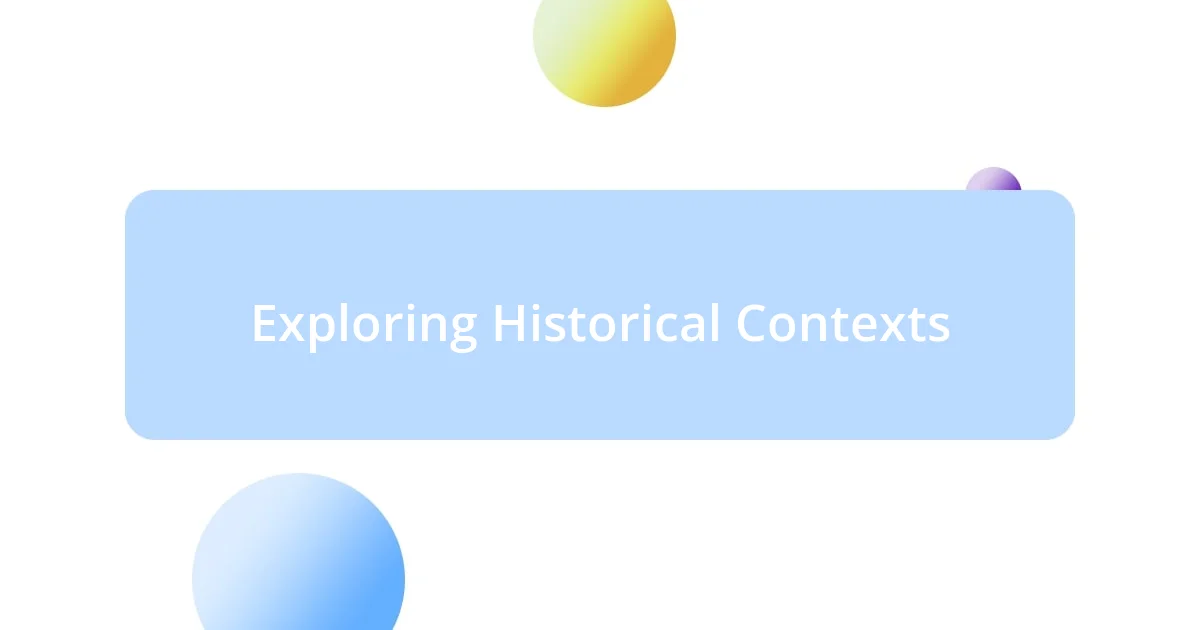
Exploring Historical Contexts
Exploring the historical contexts of ancient cultures has profoundly shaped my understanding of humanity. During a visit to the pyramids of Egypt, I was struck by the colossal scale and precision of their construction. It made me ponder the socio-political structures that could support such monumental projects and what they reveal about the values and priorities of that civilization.
In my research, I discovered that ancient texts often serve as windows into the every day of bygone societies. For instance, when I read about the Code of Hammurabi, I realized it wasn’t just a list of laws; it was a reflection of the moral compass of Babylonian society. What values are embedded in our laws today, and how might they evolve in the future?
The more I explore these contexts, the more I notice patterns and variances that resonate through time. I remember attending a seminar on Native American traditions where elders shared their oral histories, demonstrating the significance of storytelling as a cultural glue. How do we continue these practices in our fast-paced world, and what can that teach us about honoring our own histories?
| Ancient Culture | Historical Context |
|---|---|
| Egyptians | Monumental architecture reflecting centralized power and religious beliefs. |
| Mesopotamians | Codified laws exemplifying societal ethics and governance. |
| Native Americans | Oral traditions preserving history and community values amidst change. |
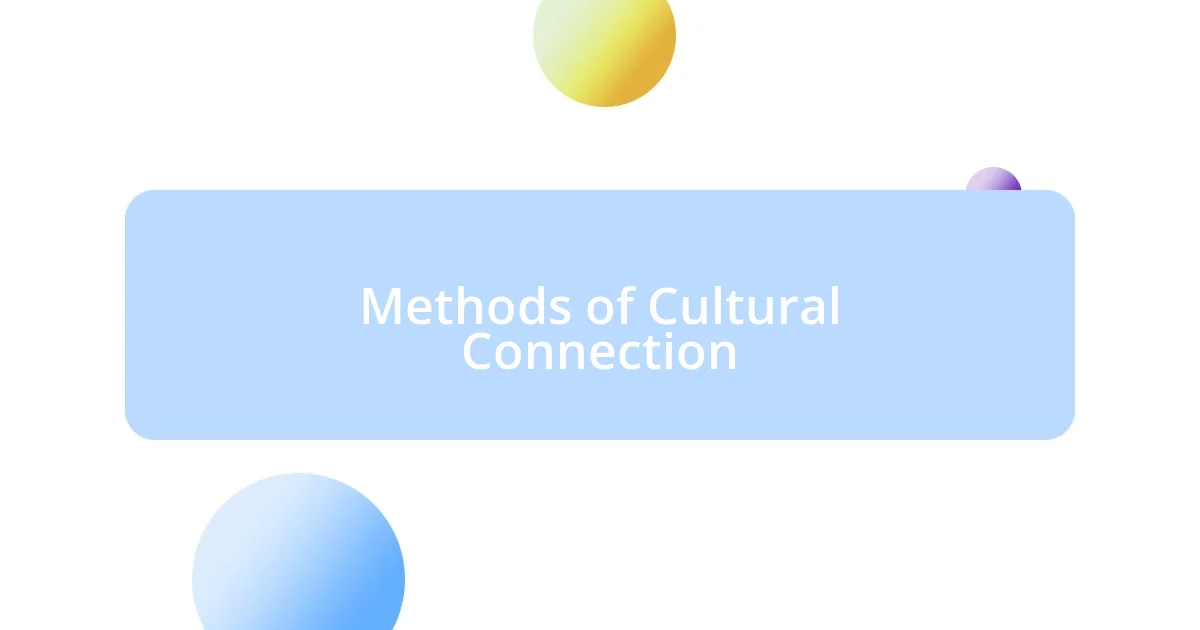
Methods of Cultural Connection
Connecting with ancient cultures can take many forms, allowing us to experience their richness in diverse ways. One approach I find particularly impactful is immersion—whether through travel to historical sites or through participating in cultural events. I recall the first time I joined a traditional dance gathering in a small village. The rhythm of the drums and the vibrant costumes made me feel more connected than ever, almost as if I was channeling the spirits of those who danced before me. It’s an experience I still cherish, as it opened my eyes to the emotions and stories woven into every movement.
Here are several methods to enhance cultural connection:
- Travel to Historical Sites: Visiting ancient ruins or monuments can evoke a sense of wonder and grounding.
- Participating in Rituals: Engaging in traditional practices, such as ceremonies or festivals, can deepen one’s understanding of cultural values.
- Language Learning: Studying an ancient language helps unlock the nuances of thought and expression that defined that culture.
- Art Creation: Trying your hand at traditional crafts or art forms can bridge personal creativity with historical traditions.
- Oral Histories: Listening to elders share stories preserves culture and keeps connections alive.
Each of these methods resonates deeply with my own journey, reminding me that the pulse of ancient cultures is still very much alive in our world today.
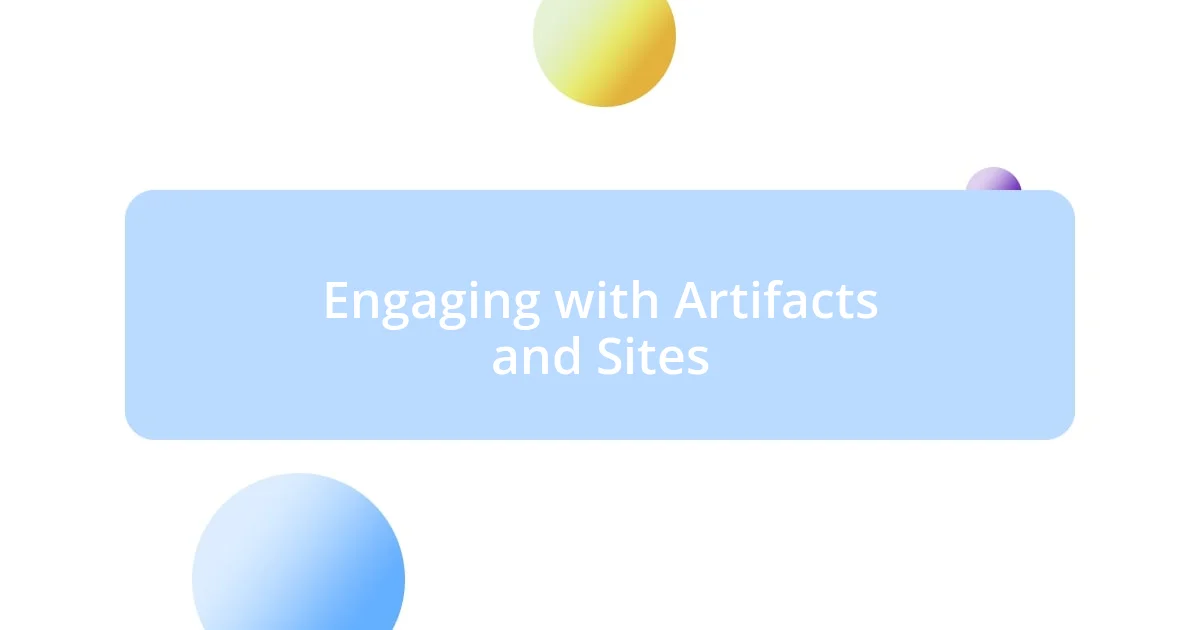
Engaging with Artifacts and Sites
Engaging with artifacts and historical sites has always been a thrilling experience for me. When I stood in front of the Rosetta Stone at the British Museum, I felt a rush of excitement—this stone served as the key to understanding ancient Egyptian hieroglyphs! I couldn’t help but think about the countless scholars who had devoted their lives to unlocking the secrets held within its inscriptions. How many minds have come before me, each one adding to the tapestry of knowledge about a civilization long gone?
I also recall the moment I touched a shard of pottery at an archaeological dig. The sensation was surreal. It was as if I was connecting directly with the hands that crafted it thousands of years ago. There’s something transformative about handling these items; they carry echoes of everyday life from a time we can barely imagine. It raises a question: what stories do these fragments tell, and how can we honor those narratives today?
Visiting historical sites is another level of connection. While wandering through the ancient city of Machu Picchu, I was enveloped by both awe and humility. The sheer ingenuity of the Inca in constructing that place against such a dramatic backdrop inspired me to appreciate the harmony of nature and culture. It made me ponder how history intertwines with our present—what can we learn from their successes and failures that might guide us in our own lives?
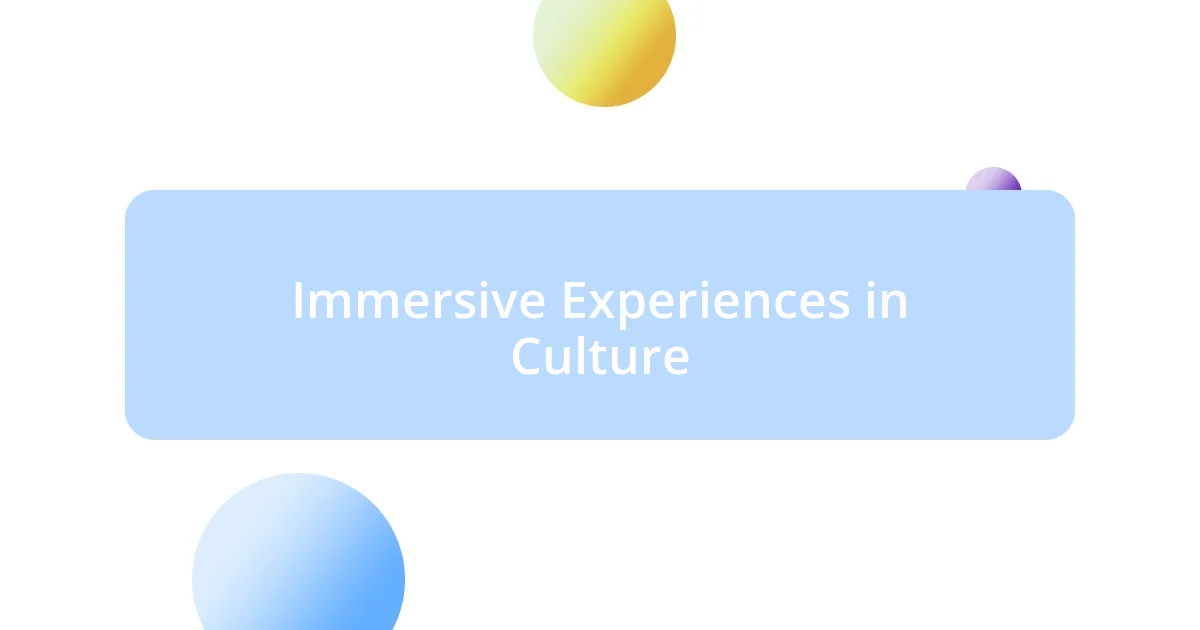
Immersive Experiences in Culture
Participating in cultural events offers an unparalleled opportunity to immerse oneself in the traditions of ancient societies. I vividly remember attending a harvest festival in a rural village, where the air was filled with laughter, song, and the aroma of freshly baked bread. Each face in the crowd radiated joy as they shared stories that passed down through generations. It made me realize how vital these celebrations are for preserving cultural identity. It prompts the question: what would happen if these traditions faded away?
Exploring the art forms of ancient cultures has always sparked my curiosity. I found myself in a pottery workshop, where the instructor guided us through techniques used centuries ago. As I molded the clay, I could feel the warmth from my hands merging with the history embedded in the material itself. Here, art became more than just a craft; it transformed into a dialogue with the past. It left me wondering—how can we honor these art forms in our modern lives?
Another memorable experience was learning an ancient language. I enrolled in a course on Latin, motivated by its influence on so many languages today. Each word felt like a treasure, revealing layers of meaning and thought from a culture that valued eloquence. Thus, I found myself contemplating how language shapes our understanding of the world. How do the words we choose define our connection to history and to one another?
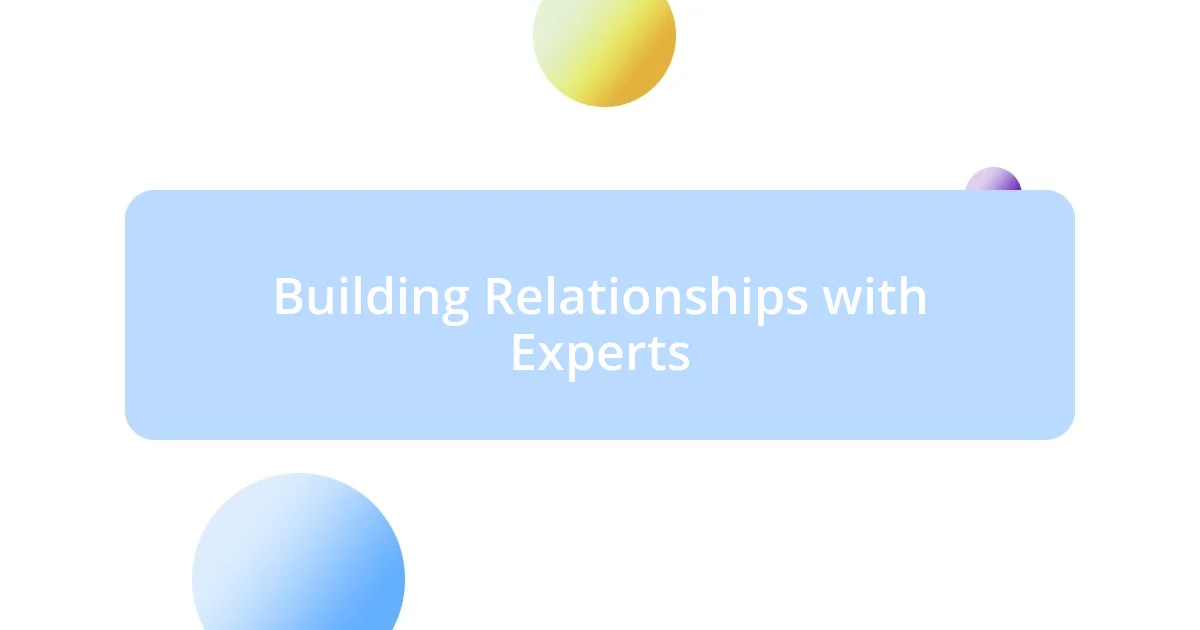
Building Relationships with Experts
Building relationships with experts requires an authentic approach and a willingness to learn. I remember reaching out to an archaeologist whose work on the Maya intrigued me. After a few emails and a warm phone call, we connected on a personal level, sharing stories of our journeys into this fascinating world. It taught me that genuine curiosity can open doors and foster mutual respect.
Another memorable interaction was at a symposium where I approached a historian after her lecture on ancient trade routes. My heart raced as I asked a question about her research. To my delight, she shared insights I had never considered, explaining how these routes influenced cultural exchanges. That exchange underscored for me how powerful a face-to-face connection can be; it deepens the conversation in ways that emails simply can’t.
As I continued to engage with experts, I learned the importance of being open to feedback and ready to evolve. In one workshop, a leading art historian critiqued my interpretations of ancient artifacts. Initially, it stung, but I realized she was guiding me toward a more nuanced understanding. This experience reinforced that building relationships isn’t just about what I can gain, but also about embracing the chance to grow through those connections. How many opportunities do we miss out on by not seeking out these valuable conversations?
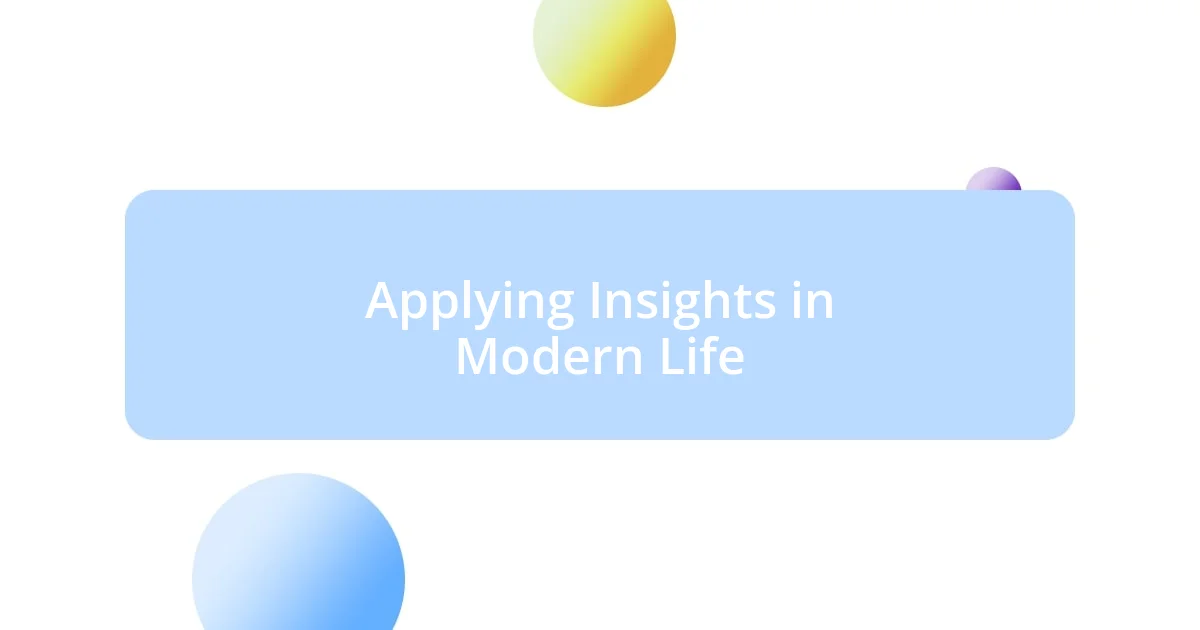
Applying Insights in Modern Life
Reflecting on the insights gained from ancient cultures, I find that they encourage us to prioritize community and connection in our modern lives. For instance, after participating in a traditional drum circle, I left feeling a deep sense of belonging, which made me reevaluate how I engage with my own community. Are we too often caught up in our busy lives to notice the beautiful threads that weave us together?
Incorporating ancient wisdom into our daily routines can also be transformative. One evening, I began practicing mindfulness based on rituals I studied, such as the simple act of silent reflection practiced by Buddhist monks. It was incredible how dedicating just a few minutes to this practice grounded me and fostered clarity in my thoughts. I often wonder, how much more peace might we find if we embraced these mindful pauses more frequently?
Moreover, ancient perspectives on sustainability resonate deeply with today’s challenges. After visiting a permaculture farm that implemented techniques passed down from indigenous cultures, I felt inspired to apply similar principles in my gardening. It made me question: how can we shift our consumption habits to honor the earth, just as those ancient societies did? Embracing these insights from the past isn’t just about honoring tradition; it’s about forging a better future.










